#lung cancer specialists
Text
5 LIFESTYLE HABITS THAT COULD BE PUTTING YOU AT RISK FOR CANCER

A well-balanced diet rich in nutrients is essential for maintaining a healthy body and reducing the risk of cancer. Here’s how different food groups contribute to cancer prevention, according to Dr. Ashish Gupta, a USA trained, American board-certified medical oncologist, and Chief of Medical Oncology at Unique Hospital Cancer Centre, Dwarka, India:
Fruits and Vegetables: Packed with vitamins, minerals, and antioxidants, fruits and vegetables play a crucial role in reducing the risk of various cancers, especially those affecting the digestive system. Incorporating a variety of colorful fruits and vegetables into your diet can provide protective benefits against cancer.
Whole Grains and Legumes: Opting for whole grains like brown rice, oats, and whole wheat, along with legumes such as lentils and beans, can help lower the risk of colorectal cancer. These fiber-rich foods aid in digestion and promote overall gut health.
Lean Proteins: Choose lean sources of protein such as fish, poultry, tofu, nuts, and seeds over processed meats like bacon and sausage. Processed meats have been linked to an increased risk of colorectal cancer, making it advisable to limit their consumption, especially in children.
Healthy Fats: Incorporating sources of healthy fats like olive oil, avocados, and nuts into your diet can help reduce the risk of certain cancers. Conversely, diets high in saturated and trans fats, often found in processed and fried foods, may increase cancer risk, particularly prostate cancer.
Dairy and Alternatives: Opt for reduced-fat dairy products and alternatives to maintain a healthy balance of calcium and protein in your diet. High intake of dairy fat has been associated with an elevated risk of prostate cancer, so moderation is key.
Lifestyle Factors and Cancer Risk
Dr Ashish Gupta said, in addition to diet, several lifestyle factors can influence the likelihood of developing cancer. Here are some important considerations:
Smoking: Tobacco use is the leading cause of lung cancer worldwide. Quitting smoking and avoiding second-hand smoke are crucial steps in reducing the risk of lung cancer and other smoking-related cancers.
Physical Activity: Regular exercise not only helps maintain a healthy weight but also reduces the risk of various cancers, including breast and colon cancer. Aim for at least 150 minutes of moderate-intensity exercise per week.
Alcohol Consumption: Limiting alcohol intake can significantly lower the risk of several cancers, such as those of the mouth, throat, esophagus, liver, and breast. It’s recommended to adhere to moderate drinking guidelines to minimize cancer risk.
Sun Protection: Protecting your skin from harmful UV rays by wearing sunscreen, protective clothing, and seeking shade can reduce the risk of skin cancer, including melanoma.
Specific Foods and Their Impact on Cancer Risk
Understanding how certain foods can affect the risk of specific types of cancer is crucial for making informed dietary choices. Here’s a closer look at some common cancers and dietary recommendations by Dr Ashish Gupta:
Lung Cancer: While fruits and vegetables offer some protection against lung cancer, the most effective prevention strategy remains avoiding tobacco smoke, including second-hand smoke.
Breast Cancer: Incorporating mono-unsaturated fats from sources like olive oil and increasing vegetable intake can help reduce the risk of breast cancer. Limiting alcohol consumption is also important for breast cancer prevention.
Prostate Cancer: Men can reduce their risk of prostate cancer by maintaining a healthy weight, consuming vegetables like tomatoes rich in lycopene, and avoiding a high-fat diet predominantly from animal sources.
Bowel Cancer: A diet high in fiber from vegetables and grains, along with limited consumption of red and processed meats, can help lower the risk of bowel cancer. Additionally, maintaining an active lifestyle is beneficial.
Conclusion
In conclusion, adopting a healthy diet and lifestyle can significantly reduce the risk of developing cancer. As per Dr Ashish Gupta, incorporating nutrient-rich foods, engaging in regular physical activity, and avoiding harmful habits like smoking and excessive alcohol consumption, you can take proactive step
#best oncologist in delhi ncr#best oncology doctor in delhi#cancer tratment in dwakra#unique cancer hospital#top oncologists in dwarka#cancer doctor in delhi#best doctor for breast cancer#breast cancer treatment in delhi#lung cancer specialists#lung cancer treatment in delhi
0 notes
Text
We are delighted to introduce Dr. Amit Pandey, who is widely recognized as the best oncologist in Lucknow. With his exceptional expertise and compassionate approach, Dr. Amit Pandey specializes in the treatment of various types of cancers.
#best oncologist in lucknow#Leukemia treatment in lucknow#Myeloma treatment in lucknow#Breast cancer specialist in lucknow#Lung cancer treatment in lucknow#lymphoma treatment in lucknow#targeted tharapy in lucknow#Best Lung cancer treatment in lucknow#Lung cancer doctor in lucknow#top Lung cancer doctor in lucknow#Gastrointestinal cancer treatment in Lucknow#Genitourinary cancer doctor in lucknow#Brain Cancer Treatment in Lucknow#Brain Cancer doctor in lucknow#Top Brain Cancer doctor in lucknow#Nack cancer Treatment in Lucknow
2 notes
·
View notes
Text
Lung Cancer Day 2022! | Best Medical Oncologist in Kalyan Nagar

#Lung Cancer Day#Lung Disease#Lung Treatment#Lung Health#Cancer#Medical Oncologist#Cancer Specialist#Cancer Doctor#Bangalore
3 notes
·
View notes
Text
Nurturing Young Lives Pediatric Care at We Care Clinic

Pediatricians play an important role in ensuring the health and wellness of our children. From infancy through adolescence, these medical professionals provide comprehensive care, guidance, and support to ensure optimal physical, emotional, and developmental growth. In this article, we’ll explore the vital role of pediatricians in nurturing the health of children and their families, while also highlighting the importance of chest care and the role of specialists in this area.
Foundations of Pediatric Care
Paediatricians are specialised doctors who are trained to meet the specific medical requirements of children ranging from infancy to teenagers. Their knowledge spans a wide range of topics, including preventive care, sickness diagnosis and treatment, developmental assessments, and nutritional, behavioural, and safety counselling.
Chest care is a crucial aspect of pediatric care, especially for children with conditions affecting their respiratory system. Pediatricians often collaborate with a chest specialist or a pulmonologist and chest physician to provide comprehensive care for conditions such as asthma and bronchitis.
Preventive Care
Preventive care forms the cornerstone of pediatric practice. Regular check-ups, immunisations, and screenings are vital for monitoring the development and growth of a kid and early detection of any potential health risks. By staying up-to-date with recommended vaccinations like the HPV vaccine and booster vaccines, pediatricians help prevent infectious diseases and identify developmental delays or health issues before they escalate.
Parents often seek a pediatrician near me for convenience, ensuring regular visits to a clinic near me for timely preventive care.
Diagnosis and Treatment
When a child falls ill or exhibits symptoms of an underlying condition, pediatricians are equipped to diagnose and treat a diverse range of ailments. From common childhood infections like colds and ear infections to chronic conditions such as asthma or diabetes, pediatricians possess the expertise to provide accurate diagnoses and develop personalized treatment plans tailored to each child’s needs.
For respiratory issues, a pediatrician might refer the child to a chest disease doctor or a pulmonologist is a doctor for treating complex lung conditions. For instance, conditions like asthma, bronchitis, and lung cancer symptoms require specialized care from a chest pulmonologist or pulmonologist specialist doctor.
Developmental Assessments
Children undergo rapid physical, cognitive, and emotional development during their formative years. Pediatricians monitor these milestones closely, conducting developmental assessments to ensure children are progressing appropriately. Early identification of developmental delays or behavioral concerns allows pediatricians to intervene promptly, offering interventions and resources to support healthy growth and development.
Counseling and Guidance
Beyond medical care, paediatricians are trusted counsellors to parents, providing advice on numerous aspects of child-rearing. Paediatricians provide vital support to families by providing advise on breastfeeding, sleep habits, managing behavioural obstacles, and navigating teenage issues, allowing parents to make knowledgeable choices that improve their children’s health and well-being.
For respiratory health concerns, pediatricians might advise on smoking remedies for parents to create a healthier environment or refer to a sleep medicine specialist if sleep disorders are suspected.
Advocates for Children’s Health
Pediatricians are not only healthcare providers but also advocates for children’s health on a broader scale. They work tirelessly to promote public health initiatives, advocate for policies that benefit children and families, and address disparities in access to healthcare services. Paediatricians work to ensure a healthier future for all children by participating in neighbourhood outreach programmes, conducting research, and partnering with other healthcare professionals.
In cases of severe respiratory conditions like lung cancer, pediatricians work closely with chest disease specialists and pulmonologist specialists to provide comprehensive care and support. This collaborative approach ensures that children receive the best possible care tailored to their specific needs.
Conclusion
Pediatricians play an indispensable role in safeguarding the health and well-being of children from infancy through adolescence. Paediatricians provide comprehensive care that covers the special requirements of young patients and their families, drawing on their skills in preventative care, diagnosis, developmental evaluations, treatment, and counselling. As advocates for children’s health, pediatricians work tirelessly to promote a holistic approach to pediatric care, ensuring every child has the opportunity to thrive and reach their full potential.
For specific conditions like asthma and bronchitis, pediatricians often refer to or collaborate with specialists such as a pulmonologist and chest specialist or a chest disease doctor to provide targeted care. Whether it’s a routine check-up at a walk-in clinic near me, managing an allergic reaction, or addressing chest pain, pediatricians and chest care specialists work hand in hand to ensure the best outcomes for children’s health.
#we care clinic#lung cancer symptoms#chest disease doctor#chest disease specialists#pulmonologist specialist doctor.
0 notes
Text
For premier lung cancer care in Gurgaon, trust Chest Surgery India and Dr. Parveen Yadav. Experience cutting-edge treatments and personalized care. Schedule your consultation today.

#lung cancer treatment in gurgaon#lung cancer doctor in delhi#lungs specialist in delhi ncr#best thoracic surgeon in gurgaon#best lung cancer hospital in delhi
0 notes
Text
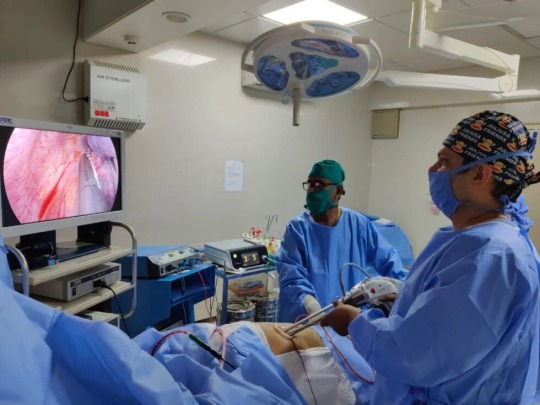
Dr. Amol Bhanushali - The Best Chest Specialist in Thane
When it comes to your chest health, trust only the best. Introducing Dr. Amol Bhanushali, the leading chest specialist in Thane, renowned for his expertise, compassion, and commitment to patient care. Dr. Amol Bhanushali is widely recognized as the best thoracic surgeon in Mumbai. His exceptional skills and knowledge make him a trusted & best thoracic surgeon in Mumbai for lung cancer. For more information, visit us online at https://dramolbhanushali.com/about-us/
#best thoracic surgeon in mumbai#lung surgeon in thane#thoracic surgery center#chest specialist in thane#best thoracic surgeon for lung cancer
0 notes
Text
Supporting a Loved One with Lung Cancer: Some Practical Tips and Emotional Guidance From Lung Cancer Specialist In Surat Cancer Specialist In Surat
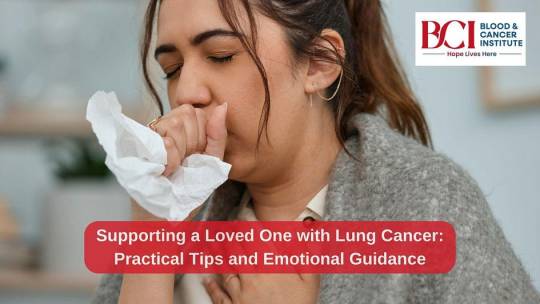
Watching a loved one battle lung cancer can be a heart-wrenching experience. The journey is laden with emotional turbulence and practical challenges, leaving caregivers feeling overwhelmed and uncertain about how best to support their loved one. In times like these, practical tips and emotional guidance can provide a much-needed anchor. Here, we explore ways to support a loved one with lung cancer, offering both practical advice and emotional support from our cancer specialists in Surat at BCI- Blood & Cancer Institute, to navigate this challenging journey together.
Educate Yourself
Understanding lung cancer and its treatment options is crucial. Take the time to educate yourself about the disease, its stages, and available treatments. This knowledge will not only help you support your loved one better but will also enable you to ask informed questions to your lung cancer specialist in Surat during medical appointments.
Be an Active Listener
Sometimes, the greatest support comes from simply being present and listening attentively. Allow your loved one to express their fears, frustrations, and hopes without judgment. Offer reassurance and validation, acknowledging their feelings and providing a safe space for them to share.
Encourage Open Communication
Encourage open communication between you and your loved one. Be willing to initiate conversations about their treatment preferences, fears, and concerns. Create an environment where they feel comfortable discussing their emotions and needs openly.
Assist with Practical Tasks
Managing daily tasks can become challenging for someone undergoing cancer treatment. Offer your assistance with chores, errands, meal preparation, or transportation to medical appointments for cancer treatment in Surat. Your support with practical tasks can alleviate some of the burdens your loved one may be facing.
Provide Emotional Support
Dealing with a cancer diagnosis is emotionally taxing. Be a source of comfort and emotional support for your loved one. Offer words of encouragement, hugs, and affection. Let them know that you are there for them, no matter what.
Respect Their Independence
While it’s essential to offer support, it’s equally important to respect your loved one’s independence and autonomy. Allow them to make decisions regarding their treatment and care whenever possible. Respect their choices, even if they differ from your own preferences.
Encourage Self-Care
Remind your loved one to prioritize self-care amidst their treatment. Encourage them to rest when needed, engage in activities they enjoy, and practice relaxation techniques such as meditation or gentle exercise. The oncologists from BCI, one of the best cancer hospitals in Surat, say it’s vital to take care of their physical and emotional well-being during this challenging time.
Seek Support for Yourself
Supporting a loved one with lung cancer can be emotionally draining. It’s essential to prioritize your own well-being and seek support when needed. Reach out to friends, family members, or support groups for caregivers. Sharing your experiences and feelings with others who understand can provide comfort and solace.
Stay Positive, But Realistic
Maintaining a positive outlook can be beneficial for both you and your loved one. However, it’s also crucial to balance optimism with realism. Acknowledge the challenges ahead while remaining hopeful and supportive. Celebrate small victories and milestones along the way.
Be Flexible and Adaptable
Cancer treatment can be unpredictable, with changes in schedules, medications, and side effects. Be flexible and adaptable to these changes, adjusting your plans and expectations as needed. Flexibility will help you navigate the ups and downs of the journey more effectively.
Celebrate Life
Amidst the challenges of cancer treatment, find moments to celebrate life and cherish precious memories together. Plan activities and outings that bring joy and laughter to both you and your loved one. Creating positive experiences can provide moments of respite from the difficulties of treatment.
Stay Informed About Support Resources
Explore support resources available for both you and your loved one. This may include counseling services, support groups, financial assistance programs, or alternative therapies. Knowing where to turn for additional support can help ease the burden and provide valuable assistance.
Conclusion
Supporting a loved one with lung cancer is a journey filled with both challenges and opportunities for growth. By offering practical assistance, emotional support, and unwavering encouragement, you can make a significant difference in your loved one’s experience. Remember to take care of yourself along the way, seeking support and finding moments of joy amidst the difficulties. Together, you can navigate this journey with strength, resilience, and love.
0 notes
Text
Best lung cancer treatment
At Rajiv Gandhi Cancer Institute and Research Centre (RGCIRC), we are dedicated to providing cutting-edge lung cancer treatments that focus on stopping the growth of cancer cells and preventing their spread. Understanding that each case of lung cancer is unique, our team of expert oncologists meticulously evaluates each patient's condition to determine the most effective treatment strategy. Our approach includes a variety of options such as surgery, radiation therapy, chemotherapy, and targeted therapies, tailored to offer the best chance to overcome lung cancer. Trust RGCIRC to support you with comprehensive care and advanced treatment options in your fight against lung cancer.
For more information: https://www.rgcirc.org/patient-family/types-of-cancer/lung-cancer
0 notes
Text
Stage 4 Treatment for Lung Cancer in Noida - Dr. Manish Singhal
In need of professional lung cancer treatment in Noida? Trust Dr. Manish Singhal for compassionate support and innovative treatment for lung cancer in noida and strategies tailored to your specific condition.
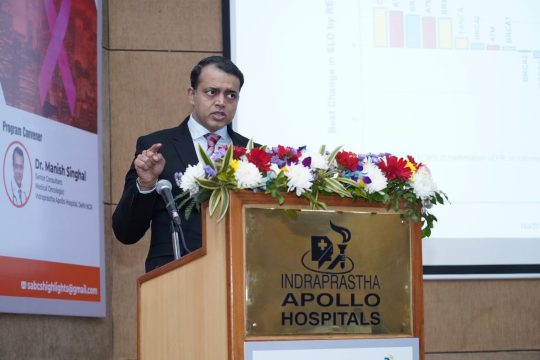
Stage 4 lung cancer, also known as metastatic lung cancer, is an advanced stage of the disease where cancer cells have spread beyond the lungs to other organs or tissues in the body. It presents significant challenges in terms of treatment and prognosis, requiring a comprehensive and multidisciplinary approach.
Challenges of Treating Stage 4 Lung Cancer
Treating stage 4 lung cancer is complex due to its advanced nature and the likelihood of cancer spreading to distant sites within the body. While treatment aims to control the disease, relieve symptoms, and improve quality of life, the prognosis for stage 4 lung cancer is generally less favorable compared to earlier stages.
Importance of Specialized Treatment in Noida
Seeking specialized treatment for stage 4 lung cancer in Noida offers several advantages for patients. Noida is home to leading medical facilities equipped with advanced technologies and experienced healthcare professionals who specialize in managing complex cancer cases, providing patients with access to comprehensive and personalized care.
Introducing Dr. Manish Singhal

Dr. Manish Singhal is a distinguished oncologist renowned for his expertise in treating stage 4 lung cancer. With a focus on delivering compassionate and evidence-based care, Dr. Singhal combines his clinical acumen with a patient-centered approach to ensure optimal outcomes for individuals facing advanced lung cancer.
#treatment for lung cancer in noida#Cancer Doctor in Noida#Best Cancer Doctor in Noida#Oncologist in Noida#Cancer Specialist in Noida#Best Oncologist in Noida
0 notes
Text
How air pollution is leading to lung Cancer?
Breathing is an unconscious and a natural process. How many times do we think of the quality of air we breathe in? Well! We cannot afford to escape this breathing process but all we can do is to ponder about the ways of controlling the pollution contributing factors. Air pollution is not only harmful to our health but is influences every single creature present on this planet. Human health is incredibly disturbed by the pollutants present in the air. Recent research conducted by the World Health Organization claims that air pollution is affecting nearly 90 percent of people around the globe. Inhabitants of many states are struggling to breathe quality air. Most of the polluting factors can easily be controlled by taking proper measures.
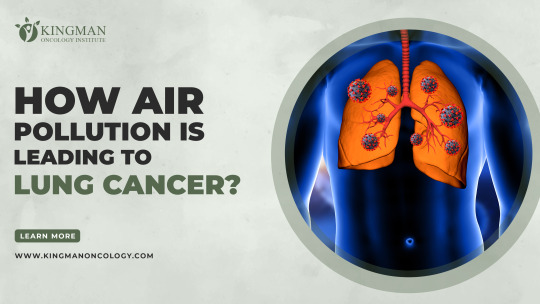
Just by eliminating certain polluting factors, we can improve the quality of air as well as our way of living. let's see and understand how pollution is responsible for harming our lungs and how it impacts our overall health as well as our way of living and what are the various lung cancer treatments available to save lives.
Significant risks to one's health are posed by air pollution, and there is evidence linking specific air pollution exposure to a higher risk of lung cancer.
Several mechanisms contribute to the complex and multifaceted relationship between air pollution and lung cancer. These include:
Stress from Oxidation and Inflammation: The respiratory system experiences inflammation and oxidative stress as a result of air pollution. Reactive oxygen species (ROS) and inflammatory reactions can arise from long-term pollution exposure. It is well-recognized that oxidative stress and chronic inflammation cause DNA damage and encourages cellular mutations, which in turn aid in the development of cancer.
Carcinogen Inhalation: We are completely unaware of the components we are inhaling with air, some of the harmful substances like Polycyclic aromatic hydrocarbons (PAHs), benzene, formaldehyde, and heavy metals are among the carcinogens found in air pollution. Lungs are linked with our breathing cycle consequently polluted air can enter the lungs directly and start processes that can eventually lead to cancer development when people breathe it in.
Ultrafine and Fine Particle Particulate Matter (PM2.5): Another predominant reason for attracting cancer could be owing to the intake of ultrafine particles. The respiratory system can be deeply penetrated by fine particulate matter, particularly by ultrafine particles and those with a diameter of 2.5 micrometers or less (PM2.5). These granules may transport particles that may contain carcinogenic chemicals, and extended exposure to them may cause cellular damage and chronic inflammation, which raises the risk of developing cancer.
Creation of Adducts of DNA: Can you ever imagine that just by breathing harmful air, our DNA can undergo change or be impacted? Well! That’s true, the research studies claim that breathing in harmful air causes changes in the DNA structure of human beings. There are air pollutants that can create DNA adducts, like PAHs. Chemical alterations known as "DNA adducts" can cause structural and functional problems for DNA. These adducts have the potential to cause genetic mutations, which over time raise the risk of cancer-related unchecked cell growth. So, your poisonous breathing can alter the DNA structure as well, which is the most serious concern ever.
Changes in Genes and Epigenetics: It is bewildering to know how unconsciously we may become a target of serious health concerns, not only this but how it can make changes in our genetic and epigenetic structure. Lung cells may undergo genetic and epigenetic changes as a result of prolonged exposure to air pollution. These changes may have an impact on the regulation of genes related to DNA repair, apoptosis, and cell cycle control, which could aid in the development and spread of cancer.
Reduced Immune Response: There is an immediate need to think about the quality of the air we are breathing in as poor-quality air intake may lead to the weakening of the Immune system too. Long-term exposure to air pollution may make it more difficult for the immune system to identify and get rid of aberrant cells. A compromised immune system might not be able to stop cancer cells from growing, which would allow them to multiply and develop into tumors.
Combined Effects with Additional Risk Factors: Rural areas where burning of wood, leftover leaves, or other substances is common for using these substances as fuel may also lead to lung-related problems. Smoking and occupational exposures are two risk factors that can interact with air pollution to produce synergistic effects that increase the risk of lung cancer. People who are exposed to both air pollution and tobacco smoke, for instance, may be at a higher cumulative risk than people who are only exposed to one of the two factors.
Measures to protect from Air pollution: Keeping oneself protected from air pollution is essential for preserving general health and respiratory health. The following actions can be taken by individuals to lessen their exposure to air pollution.
Keep an eye on the air quality: Keep yourself updated about the local air quality. Real-time air quality indices that show the current levels of pollution are available in many places. Make plans for outdoor activities based on this information, particularly during times of high pollution.
Pick Routes with Less Pollution: Routes should be chosen to avoid industrial or highly populated areas. The least polluted routes can be selected by using applications or websites that offer real-time traffic and pollution data.
Reduce Individual Smoking Exposure: Keep yourself away from passive or active tobacco smoke exposure. In addition to being a big risk factor for respiratory problems, smoking greatly increases indoor air pollution.
Make green areas: Endorse and promote the establishment of green spaces in metropolitan settings. The quality of the air can be enhanced by plants by absorbing pollutants.
Preserve the Health of Your Respiratory System: Maintain a healthy lifestyle to keep respiratory health at its best. The immune system can be strengthened and the body can be better able to withstand environmental stresses with regular exercise, a balanced diet, and proper hydration.
Vent Living Spaces Properly: Make sure your house and place of business have enough ventilation to let in outside air. This can enhance overall air quality by reducing indoor pollutants
Employ public transportation or carpooling: Using the bus, carpooling, biking, or walking can all help individuals lower their carbon footprints. In addition to lowering individual pollution exposure, this also helps reduce pollution overall.
Reduce Your Outside Activities on Days with Poor Air Quality:
If the air quality is bad, try to limit your outdoor activities, especially intense workouts. Plan your outdoor activities for when pollution is at its lowest, if at all possible.
We can save ourselves to a large extent from harmful pollution emitting elements by adopting these measures and we can work on our health and environment protection. These measures are crucial for saving our present and future generations too.
It's crucial to remember that, despite a large body of research connecting air pollution to lung cancer, each person's risk is unique and depends on several variables, such as the amount and duration of exposure, the particular pollutants involved, and their susceptibility. The incidence of lung cancer and other respiratory diseases can be decreased by promoting clean air initiatives and reducing air pollution, which can have a substantial positive impact on public health.
Conclusively, the association between lung cancer and air pollution highlights the significant influence of environmental factors on public health. Inhaling carcinogens, breathing in fine particulate matter, inducing oxidative stress and inflammation, and initiating genetic and epigenetic alterations in lung cells are just a few of the intricate pathways through which air pollution causes lung cancer. Together, these elements encourage normal cells to develop into malignant forms. A comprehensive strategy to reduce and mitigate environmental pollutants is urgently needed, as the link between air pollution and lung cancer raises serious concerns about global health. Maintaining better air quality helps prevent long-term health problems in addition to addressing the immediate health risks that come with pollution. You can visit Kingman Oncology cancer treatment center az and get the best possible advice over lung cancer or any other type of cancer. We can fight it with prevention and cure.
#lung cancer treatment#cancer treatment center az#cancer care institute#hematology oncology consultants#cancer care consultants#cancer treatment process#cancer treatment options#cancer specialist arizona
0 notes
Text
Lung Cancer specialist in gurgaon
Sanar International Hospitals, the epitome of advanced healthcare in Gurgaon, proudly presents unparalleled expertise in combating lung cancer. Our team of distinguished specialists is dedicated to pioneering treatments, offering hope and healing to patients battling this formidable disease. As leaders in oncology, we prioritize personalized care, employing cutting-edge technologies and tailored approaches to ensure optimal outcomes. At Sanar, our Lung Cancer specialists in Gurgaon blend compassionate support with exceptional medical prowess, guiding individuals through every stage of their journey towards recovery. Trust us for comprehensive, world-class care that prioritizes your well-being, providing solace and effective solutions in the fight against lung cancer.
0 notes
Text
10 WARNING SIGNS OF SKIN CANCER YOU SHOULD NEVER IGNORE
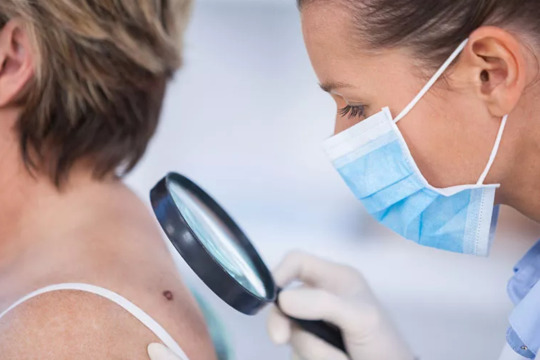
Early detection is crucial in the fight against cancer. Alongside regular screenings and check-ups, paying attention to changes in your body can aid in catching cancer at its earliest stages. Recognizing warning signs and symptoms can prompt timely medical intervention, potentially improving treatment outcomes. Here are 10 symptoms that may indicate the presence of cancer and warrant a consultation with your healthcare provider, as emphasized by Dr. Ashish Gupta, USA trained, American board-certified medical oncologist, Chief of Medical Oncology at Unique Hospital Cancer Centre in Dwarka, India
Abnormal Periods or Pelvic Pain: While irregular periods and occasional pelvic discomfort are common, persistent changes in your menstrual cycle or chronic pelvic pain could signal underlying gynecological cancers such as cervical, uterine, or ovarian cancer.
Changes in Bathroom Habits: Significant alterations in bowel or bladder habits, including persistent constipation or diarrhea, blood in stool or urine, and increased frequency of urination, may indicate colorectal, prostate, or bladder cancer.
Bloating: Chronic bloating lasting more than two weeks can be a red flag for ovarian cancer and various gastrointestinal malignancies. Monitoring and reporting persistent bloating to your doctor is crucial for timely evaluation.
Breast Changes: New breast lumps, skin dimpling, nipple changes, or unusual discharge should be promptly evaluated, as they may signify breast cancer. It’s important to note that breast cancer can affect men as well.
Chronic Coughing: A persistent cough, especially if dry, lasting more than two weeks could be a warning sign of lung cancer. Early detection through medical assessment is essential for timely intervention.
Chronic Headache: Headaches persisting for more than two weeks and unresponsive to typical treatments may be associated with brain tumors. Seeking medical attention for prolonged headaches is paramount for accurate diagnosis and management.
Difficulty Swallowing: Persistent difficulty in swallowing, sensation of food sticking in the throat, or throat pain lasting more than two weeks may indicate throat, lung, or stomach cancer and warrants medical evaluation.
Excessive Bruising: Sudden onset of unexplained bruises in unusual locations, not attributable to injury, may indicate underlying blood cancers. Prompt medical assessment is necessary for proper diagnosis and management.
Frequent Fevers or Infections: Recurrent fevers or frequent infections may suggest compromised immunity, possibly due to conditions such as lymphoma or leukemia. Timely medical evaluation is essential for appropriate management.
Oral Changes: Persistent oral sores, lesions, or painful areas, particularly in individuals with a history of smoking or heavy alcohol consumption, should be evaluated for potential oral cancers.
Skin Changes: Changes in the appearance of moles or birthmarks should be monitored closely. Utilizing the ABCDE mnemonic-Asymmetry, Border irregularity, Color variation, Diameter increase, and Evolution-can aid in identifying concerning skin changes that warrant medical attention.
Persistent Pain: Unexplained and persistent pain lasting beyond standard treatment duration requires medical assessment to rule out underlying malignancies.
Persistent Fatigue: Sudden and persistent fatigue unrelated to changes in activity level or sleep patterns may indicate underlying hematological cancers such as leukemia or lymphoma and necessitates medical evaluation.
Postmenopausal Bleeding: While postmenopausal bleeding may have various causes, persistent occurrences should prompt evaluation for cervical or uterine cancer.
Stomach Pain or Nausea: Unexplained stomach discomfort or persistent nausea lasting more than two weeks should be investigated, as they may indicate gastrointestinal or abdominal cancers.
Unexplained Weight Loss: Significant unintentional weight loss or loss of appetite without apparent cause could be indicative of various cancers, particularly those that have metastasized.
Unusual Lumps: Any new or persistent lumps or masses should be evaluated by a healthcare professional to rule out potential malignancies, especially if accompanied by other concerning symptoms.
Conclusion
Recognizing early warning signs of cancer and promptly consulting a healthcare provider for evaluation is crucial for timely diagnosis and treatment. By being vigilant and proactive about changes in your body, you can play an active role in safeguarding your health and well-being. If you are searching for the best dr in dwarka contact Dr. Ashish Gupta
#Skin Cancer in Delhi#Skin Cancer Doctor in Dwarka#best Skin Cancer Speaclist#top oncologists in dwarka#best oncologist in delhi ncr#best oncology doctor in delhi#cancer tratment in dwakra#unique cancer hospital#best doctor for breast cancer#cancer doctor in delhi#breast cancer treatment in delhi#lung cancer specialists#lung cancer treatment in delhi
0 notes
Text
Leukemia treatment in Lucknow - Dr. Amit Pandey
Dr. Amit Pandey brings an unparalleled depth of knowledge to the field of Leukemia Treatment In Lucknow. With extensive experience and a dedication to ongoing learning, he has established himself as a trusted expert in managing the intricacies of leukemia. His commitment to staying abreast of the latest medical advancements ensures that his patients benefit from the most advanced and effective treatments available.
Dr. Amit Pandey’s approach to patient care goes beyond medical proficiency. He understands that confronting leukemia is a multidimensional challenge, encompassing both physical and emotional aspects. His compassionate demeanor and genuine concern create an atmosphere of trust, allowing patients to feel supported, understood, and valued throughout their treatment journey.
Understand Leukemia Cancer: Causes, Symptoms, and Treatment with Dr. Amit Pandey
Introduction to Leukemia Cancer
Leukemia is a complex and serious form of cancer that affects the blood and bone marrow. Dr. Amit Pandey, a renowned expert, provides valuable insights into the causes, symptoms, and treatment options for leukemia.
Causes of Leukemia Cancer
While the exact causes of leukemia are not always clear, certain factors can contribute to its development:
Genetic Factors: Some genetic mutations increase the risk of leukemia, often inherited from family members.
Exposure to Radiation: High levels of radiation exposure, such as nuclear accidents or radiation therapy for other conditions, can elevate the risk.
Chemical Exposure: Prolonged exposure to certain chemicals or toxins, especially benzene, is linked to leukemia.
Certain Medical Conditions: Individuals with certain genetic disorders, such as Down syndrome, have a higher risk of developing leukemia.
Common Symptoms
Recognizing the early symptoms of leukemia is crucial for timely diagnosis and treatment. Common symptoms include:
Fatigue: Persistent fatigue and weakness, even with adequate rest, could be a sign.
Frequent Infections: An increased susceptibility to infections due to a compromised immune system.
Unexplained Bruising or Bleeding: Easy bruising, frequent nosebleeds, or bleeding gums may be indicative.
Pain or Swelling in the Abdomen: Enlarged spleen or liver might cause pain or discomfort in the abdomen.
Unintended Weight Loss: Sudden and significant weight loss without a clear reason.
Treatment Options
Dr. Amit Pandey employs a comprehensive approach to treating leukemia, tailored to the specific type and stage:
Chemotherapy: The primary treatment, using powerful drugs to kill or control leukemia cells.
Targeted Therapy: Drugs that target specific proteins or genetic markers on leukemia cells.
Stem Cell Transplant: Healthy stem cells are transplanted to replace damaged bone marrow.
Radiation Therapy: High-energy rays target and destroy leukemia cells, often used for specific types.
Immunotherapy: Enhancing the body’s immune system to recognize and attack leukemia cells.
Supportive Care: Managing symptoms, providing blood transfusions, and preventing infections are crucial.
Conclusion
Dr. Amit Pandey’s expertise in leukemia treatment is unparalleled. By understanding the causes, recognizing the symptoms, and exploring various treatment options, patients and their families can make informed decisions. If you’re seeking exceptional care and support for leukemia, Dr. Amit Pandey provides not only medical expertise but also compassion and hope on the journey toward improved health.
#best oncologist in lucknow#breast cancer specialist in lucknow#leukemia treatment in lucknow#lung cancer treatment in lucknow#lymphoma treatment in lucknow#myeloma treatment in lucknow#targeted tharapy in lucknow#ayurvedic doctor in lucknow#Lucknow
0 notes
Text
Navigating Lung Cancer: Top Thoracic Oncology Hospitals and Specialists in Delhi
Lung cancer is a formidable adversary, but in Delhi, patients have access to world-class care at the best thoracic oncology hospitals. With dedicated lung cancer specialists and advanced thoracic oncosurgery techniques, Delhi stands at the forefront of battling this disease.

The Quest for the Best Thoracic Oncology Hospitals in Delhi
When facing a diagnosis like lung cancer, finding the right hospital is paramount. Delhi boasts some of the Best thoracic oncology hospitals in Delhi, renowned for their excellence in diagnosing and treating lung cancer.
These hospitals house cutting-edge technology and a multidisciplinary team of specialists. From highly accurate diagnostic tools to state-of-the-art surgical suites, they leave no stone unturned in ensuring the best care for patients.
The Best thoracic oncology hospitals in Delhi take a patient-centric approach, focusing on individualized treatment plans. Their commitment to research and innovation means that patients can access the latest advancements in lung cancer treatment.
Lung Cancer Specialists in Delhi: Your Trusted Allies
Delhi is home to a pool of highly skilled and compassionate lung cancer specialists. These specialists bring a wealth of experience and expertise to the table, ensuring that patients receive the best possible care.
A LUNG CANCER SPECIALIST in Delhi typically follows a comprehensive approach to diagnosis and treatment. They work closely with other medical professionals, including radiologists, pathologists, and oncologists, to provide a well-rounded view of the patient's condition.
One of the key advantages of consulting a LUNG CANCER SPECIALIST in Delhi is their access to cutting-edge therapies and clinical trials. Patients can explore a range of treatment options, including targeted therapies and immunotherapies, under the guidance of these specialists.
Thoracic Oncosurgery in Delhi: Precision and Expertise
Thoracic oncosurgery plays a pivotal role in the treatment of lung cancer. THORACIC ONCOSURGERY in Delhi are known for their precision and surgical prowess. They are adept at performing complex procedures that involve the removal of cancerous lung tissue while preserving healthy lung function.
These surgeons utilize minimally invasive techniques whenever possible, resulting in shorter hospital stays and faster recovery times for patients. THORACIC ONCOSURGERY in Delhi are often at the forefront of adopting innovative surgical methods, ensuring the best outcomes for their patients.
#Best thoracic oncology hospitals in Delhi#LUNG CANCER SPECIALIST in Delhi#THORACIC ONCOSURGERY in Delhi
0 notes
Text
#best lung cancer specialists in India#lung cancer in India#lung cancer specialist#Lung Cancer Treatment#Lung Cancer Treatment In Gurgaon#Lung Cancer Treatment In India
0 notes
Text
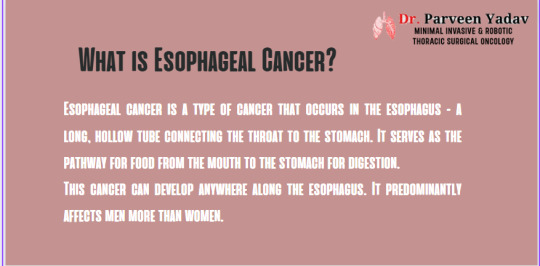
Unmasking Esophageal Cancer
Unravel the mystery of esophageal cancer! 🌟 Discover this stealthy foe that hides within the tube connecting your throat to your stomach. Explore its origins, risk factors, and types - adenocarcinoma and squamous cell carcinoma. Learn the significance of early detection and the latest treatment advances. Let's raise awareness together!
learn more: https://chestsurgeryindia.com/
#lung cancer treatment in gurgaon#lung cancer doctor in delhi#lungs specialist in delhi ncr#Esophageal cancer#adenocarcinoma#squamous cell carcinoma#early detection#risk factors#treatment advances#awareness#health#EsophagealCancerAwareness#UnmaskingTheSilentThreat.
0 notes